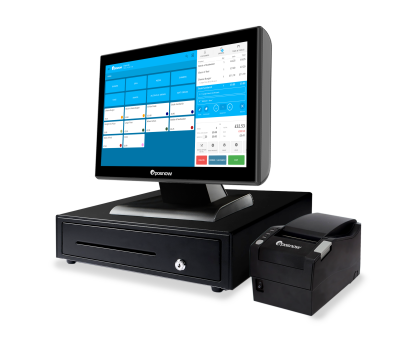Retail Marketing: Strategies and Examples
If you're the owner of a retail store, your day is filled with inventory checks, staff management, and tedious admin. It can be difficult to find the time to build and implement retail marketing strategies, especially in a busy store. Retail marketing, however, should never be overlooked.
The retail industry is incredibly competitive and many businesses never find success. Retail marketing is essential to building your business; without it, you'll struggle to attract customers. There are many different retail marketing strategies and they won't all work for all retail stores. As a business owner, it's your responsibility to find the retail marketing strategy that works for you.
In this blog, we'll be exploring the topic of retail marketing in detail. We'll also share successful retail marketing strategies and tell you how to implement them in your own business. Retail marketing can be difficult to get right, especially if you're doing it yourself, but with a strong work ethic and careful planning, you'll drive sales and find success.
What is retail marketing?
In simple terms, retail marketing refers to how a business promotes its goods and services and how it can attract customers to its stores. While traditional marketing efforts were focused on getting customers to shop at a physical store, digital marketing has become more widespread as more and more consumers have become online shoppers.
As a retailer, your main goals are to drive sales, bring new customers in-store, and maintain relationships with existing customers. A good retail marketing strategy should be designed to meet these goals. How you approach your retail marketing and your products can also change depending on the situation or the time of year. For example, you wouldn't use the same retail marketing strategy for Christmas marketing and Black Friday Marketing.
In store retail marketing and digital marketing also require different strategies. A product that sells well via in-store displays may have terrible online sales. Physical stores and online stores have different marketing needs and, as a business owner, you must have a solid grasp of the basics of retail marketing strategy.
The Four Ps
In retail marketing, four main components teach you what to consider when you're building your strategies. These are called The Four Ps. The Ps are:
- Product - This refers to the physical product you're selling. Why is this product special? What sets it apart from similar products? Why would your target market want to buy it?
- Price - This refers to your pricing strategy. How much does your product cost? Why does it cost as much or as little as it does? Do you offer competitive pricing on this product?
- Place - This refers to the location or platform you sell your product on. Is the product available in your brick-and-mortar store or online store? How is it displayed online and in your physical store?
- Promotion - This refers to how you'll make potential customers aware of your product. Will you use in-person marketing or focus on social media marketing? Do you have an email list of existing customers?
Why is it important to have a retail marketing strategy?
Without retail marketing, many retailers and name-brand stores would have never reached their full potential. Your marketing efforts are the first thing potential customers interact with and will be what initially entices them to shop at your business.
If you're looking to build professional relationships with new customers while retaining past customers, retail marketing is the only way to go.

Gain all the advantages of a POS system with detailed, flexible, downloadable reports, and so much more:
- Manage and update products quickly with easy-to-use software
- Expand your business into multiple channels and integrate with a variety of online platforms
- Manage multiple locations and salespoints with multi-site management
- Keep queues short with streamlined, modifiable sales processes
- Choose a setup that suits you with software and hardware options
Marketing strategies for retail stores
There are hundreds of tricks and strategies that retail marketers use to entice new customers and increase sales.
Every business is different, and no one-size-fits-all marketing strategy will universally work. If you're looking to generate sales, you'll need to put in the work, do some testing, and see what retail marketing strategy works best for your business.
To help you understand what tried and tested strategies are available, we've compiled a list of successful retail marketing tricks and tips. There's no harm in embracing a retail marketing mix, so pick and choose from the strategies you think will work for your online and brick-and-mortar stores.
Location, location, location
When we talk about location in retail marketing, we're talking about locations both online and in person. In-person, your marketing should focus on upping your curb appeal with new customers while keeping your customers engaged. Online marketing involves getting your products in front of your target customers with digital advertising.
Unless you're only online, your physical store is the beating heart of your business. Your store locations should be in areas you know your target audience will already be or be willing to travel to. You should prepare your retail store to attract your customers and bring them in-store. Your retail displays will play a big part in this, so take the time to arrange your shop so your customers feel engaged.
For physical stores, word-of-mouth is your best friend, so give your customers a pleasant and efficient retail experience. Being involved in your community via events and outreach will also build goodwill and cement your position as a local business worth supporting.
Your location online relies on your digital advertising strategy. You really need to stand out online, so you'll need to use both social media marketing and search engine optimization (SEO). Online sales have become increasingly important for retail businesses as more and more customers begin to shop online.
You'll need to do some research to start marketing your business effectively on social media. While having an active account on all the major social media platforms is good practice, it is important to identify which platforms are particularly popular with your target audience. Once you've done that, you can purchase targeted ads that your customers will see on their social media feeds. Make sure that your ads show off your business' unique identity and display your products in the best possible light.
SEO is a relativity new practice that can help you boost online sales. SEO is essentially fine-tuning your website to rank higher in internet search results. Search engines rank websites based on relevant keywords and the overall quality of the content on a website. It's worth looking for an SEO marketing agency that can help you manage your website and get it Google-ready.
Embrace email marketing
As with social media marketing, it's important to reach out to your customers. With retail marketing, it can be easy to overlook personal touches; reaching customers in their personal inboxes connect you more than traditional advertising.
When used correctly, email marketing can be incredibly successful considering how little it costs. You have to get your customer to sign up for your mailing list and then send relevant and informative information about your business.
An effective way to use email marketing is to include discount codes in your messages. Sending out discount codes encourages customers to stay subscribed to your emails and to shop in your store. The humble discount code is a mainstay of retail marketing for a reason.
Build customer relationships
Without a strong customer base, your retail store will struggle and ultimately fail. As part of your retail marketing, you should aim to build relationships with shoppers and improve customer loyalty. Customer loyalty programs are a simple and cost-effective way to encourage repeat customers.
Building loyalty programs can be as simple as installing an app on your point of sale (POS) system. Many modern retail POS systems, such as the Epos Now Complete Solution, come with in-built loyalty integrations that set up the program for you. Once you have it ready, you must encourage customers to sign up with their email. You can do this in-store by asking if they'd like to join at checkout. If you already have a mailing, you can send a link to join your loyalty program as part of your email marketing.
Loyalty programs work as effective pieces of retail marketing as they reward your customers for shopping with you and build a more personal relationship with the customer. While traditional advertising was generally product-focused, modern consumers react better to retail marketing, making them feel like they have a personal stake in your business. Anything that improves your customer engagement is a good thing.
The perfect POS for retail marketing
As a business owner, it can be hard to find the time to engage in retail marketing. With the Epos Now Complete solution, you can minimize your admin, give yourself more time to spend with customers and build a robust retail marketing strategy.
Epos Now provides both retail and hospitality POS systems built with you in mind. As an Epos Now user, you'll have access to informative business reports, award-winning apps, and payment processing services.
That your retail marketing to the next level by getting in touch with our expert team below.
